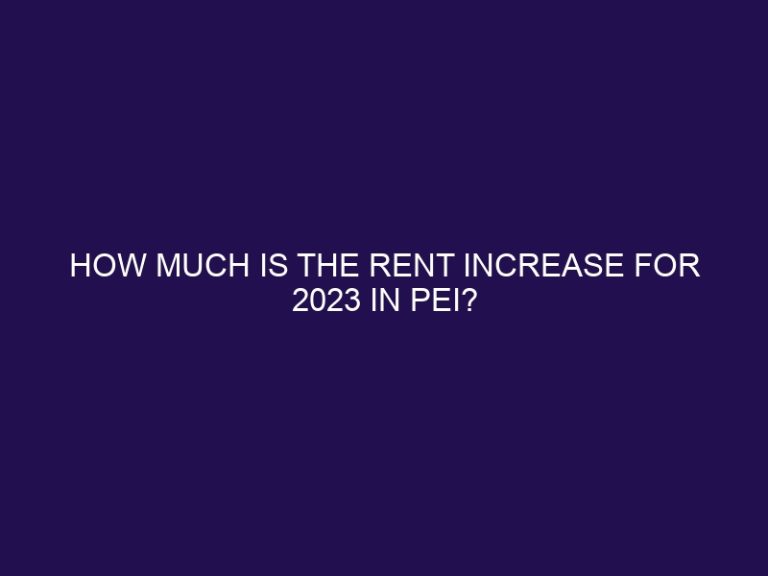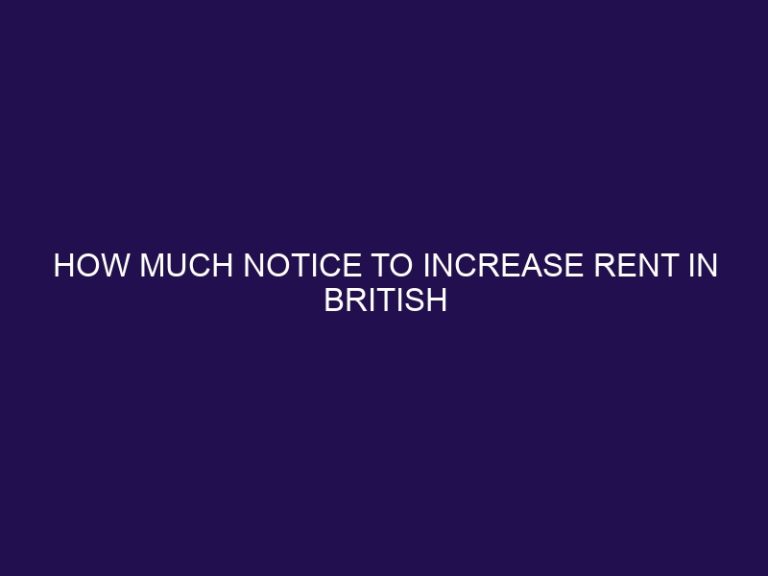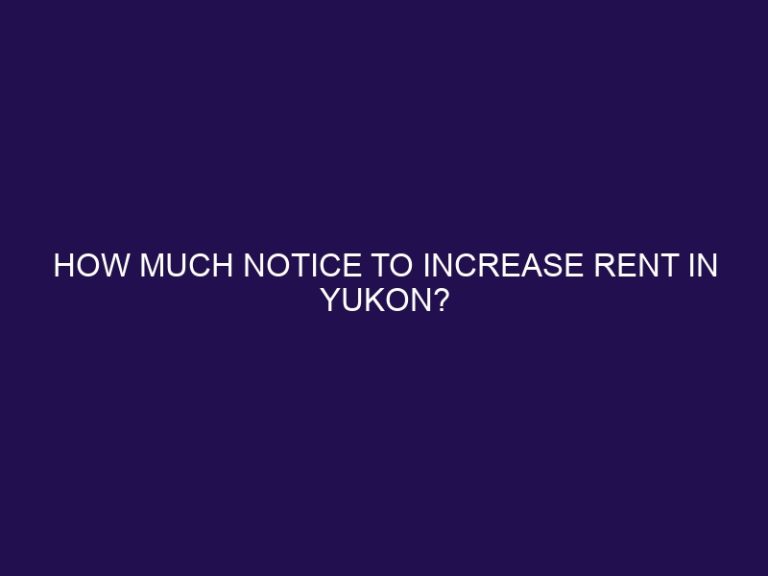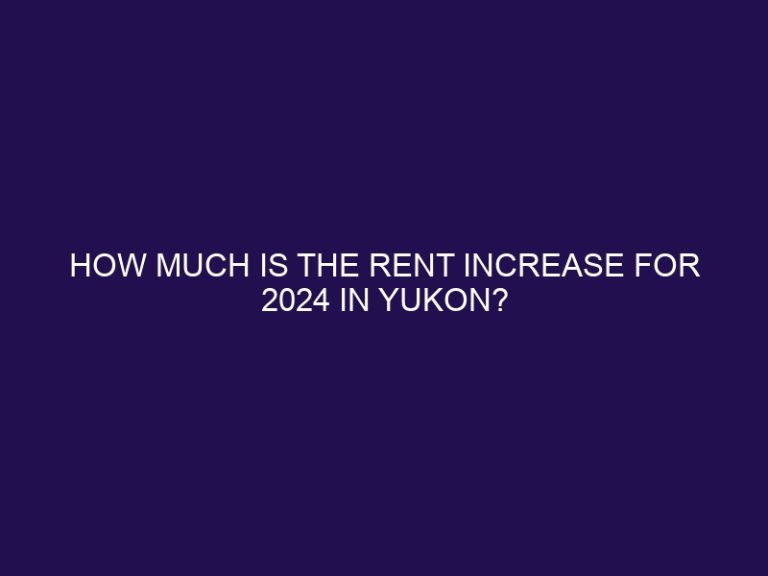How to calculate rent increase in Quebec?
.jpg)
Rent increases can be a complex and often confusing topic, especially in the province of Quebec. It’s important for both landlords and tenants to have a clear understanding of the legal framework and factors involved in calculating rent increases. In this article, we will provide an overview of rent increases in Quebec, explain the legal regulations, and discuss the factors to consider when calculating rent increases. We will explore the step-by-step process for calculating rent increases according to the Régie du logement, and provide examples for better understanding. Understanding the rights and recourse available to tenants, as well as tips for negotiating rent increases, is crucial for maintaining a harmonious landlord-tenant relationship.
Key takeaways:
- Rent increases in Quebec are regulated: The province has specific laws and regulations that govern how and when landlords can increase rent, providing tenants with certain protections.
- Factors that influence rent increase calculation: The age of the building, major renovations, improvements, and increases in municipal property taxes are among the factors that landlords consider when determining the rent increase amount.
- Calculating rent increases involves a step-by-step process: Landlords in Quebec need to follow a specific calculation process outlined by the Régie du logement to determine the maximum allowable rent increase percentage.
Overview of Rent Increases in Quebec
Rent increases in Quebec are governed by specific regulations that protect tenants’ rights. Generally, landlords are allowed to increase rent by a certain percentage each year. There are exceptions and restrictions to this rule. For example, landlords cannot increase rent for the first year of a lease, and there are maximum limits set by the rental board for subsequent years. There are additional rules regarding rent increases for buildings with multiple units, seniors, and low-income tenants. Understanding these regulations is important for both tenants and landlords to ensure compliance and fair treatment in the rental market.
Rent increases in Quebec are subject to specific regulations designed to safeguard tenants’ rights. Landlords are typically permitted to raise rent by a certain percentage annually, although there are certain exceptions and limitations to this rule. Notably, during the initial year of a lease, landlords are prohibited from increasing rent. Furthermore, the rental board establishes maximum limits for rent increases in subsequent years. It is crucial for both tenants and landlords to comprehend these regulations in order to ensure adherence and equitable treatment within the rental market.
Understanding the Legal Framework for Rent Increases
Rent increases can be a tricky subject, especially in Quebec. In this section, we’ll dive into the legal framework surrounding rent increases in this province. We’ll explore the rent control regulations that govern these increases and the different types of rent increases allowed. Get ready to unravel the complexities of rent hikes in Quebec and gain a better understanding of your rights as a tenant or a landlord.
Rent Control Regulations in Quebec
Rent control regulations in Quebec aim to protect tenants from excessive rent increases. These Rent Control Regulations in Quebec set limits on the amount landlords can raise rent each year, ensuring affordability and stable housing for tenants. In Quebec, rent increases are based on the percentage set annually by the province’s rental board, known as the Régie du logement. Landlords must follow specific guidelines when calculating rent increases, taking into account factors such as the age of the building, major renovations, and increases in municipal property taxes. Tenants also have the right to contest rent increases if they believe they are unfair or unjustified. It is important for both landlords and tenants to understand and comply with these Rent Control Regulations in Quebec to maintain a fair and harmonious rental market in Quebec.
Types of Rent Increases Allowed
| Types of Rent Increases Allowed | Description |
| Annual Rent Increase | Landlords can increase the rent annually based on a percentage set by the Régie du logement. |
| Age Increase | If the building is over a certain age, landlords can apply an additional increase to compensate for maintenance costs. |
| Major Renovation Increase | Landlords can increase rent if they have made significant renovations or improvements to the property. |
| Property Tax Increase | If there is an increase in municipal property taxes, landlords can pass on a portion of this increase to tenants. |
Factors to Consider for Rent Increase Calculation
When it comes to calculating rent increase in Quebec, there are several factors that landlords and tenants need to take into consideration. From the annual rent increase percentage to the age of the building, major renovations and improvements, and increases in municipal property taxes – each aspect plays a crucial role in determining the final figures. So, let’s dive into the key factors that shape how rent increases are calculated in Quebec and understand how they impact both landlords and tenants.
Annual Rent Increase Percentage
The annual rent increase percentage, also known as the annual rent increase rate, is a crucial factor to take into account when calculating rent increases in Quebec. Here are some important points to comprehend:
- Legal Limits: In Quebec, the Régie du logement establishes the maximum annual rent increase percentage, which is typically announced each year.
- Historical Rates: It is beneficial to review the past annual rent increase percentages in order to grasp the trend and plan future budgeting accordingly.
- Calculating the Increase: To determine the new rent for the following year, the annual rent increase percentage is applied to the current rent amount.
- Exceptions: There may be specific circumstances where landlords are granted higher rent increases, such as major renovations or improvements to the property.
- Tenant Rights: Tenants in Quebec have the right to contest a rent increase if they believe it exceeds the legal limit or if they can demonstrate that the increase is unfair.
Age of the Building
The age of the building is an important factor to consider when calculating rent increases in Quebec. Here is a breakdown of how the age of the building can impact rent increases:
| Age of the Building | Rent Increase |
| New Construction (less than 5 years) | A higher rent increase may be justified to account for the recent construction costs and modern amenities. |
| Older Buildings (more than 5 years) | Typically have lower rent increases compared to new constructions due to potential wear and tear and depreciation. |
| Heritage Buildings | Rent increases may be limited to preserve the historical value of the building. |
Considering the age of the building is essential in determining fair rent increases and ensuring compliance with Quebec’s rent control regulations.
Major Renovations and Improvements
- Major renovations and improvements to your rental property can justify a rent increase. Here are a few considerations when it comes to this:
- Extent of renovations: The more extensive the renovations, such as remodeling the kitchen or bathroom, the stronger the case for a higher rent increase.
- Cost of improvements: Consider the cost of the major renovations and improvements made. Higher costs may require a larger rent increase to recover the investment.
- Quality of upgrades: If the major renovations and improvements significantly enhance the quality and comfort of the rental unit, a higher rent increase may be justified.
- Added amenities: Any added amenities, such as installing a washer/dryer or upgrading appliances, can contribute to a higher rent increase.
Pro-tip: Before implementing any rent increase, be sure to comply with local regulations and provide proper notice to your tenants.
Increases in Municipal Property Taxes
Increases in municipal property taxes can have a significant impact on rental costs in Quebec. Here are some important factors to consider:
- Understanding the impact: Municipal property taxes are commonly included in the operating expenses of rental properties. As these taxes increase, landlords may pass on some or all of the costs to tenants through rent increases.
- Calculating the increase: Landlords must adhere to the guidelines set by the Régie du logement when determining rent increases. Increases in municipal property taxes can be taken into account when calculating the allowable rent increase percentage.
- Legal obligations: Landlords have a legal obligation to provide tenants with proper notice when increasing rent. This notice should include the reason for the increase, such as an increase in municipal property taxes.
- Tenant rights: Tenants have the right to contest an unjustified rent increase. They can follow the procedures outlined by the Régie du logement to challenge the increase.
In 2020, the city of Montreal experienced a 3% increase in municipal property taxes, which resulted in a surge of rent increases throughout the city. Tenants expressed their concerns about the rising cost of living and formed community groups to advocate for affordable housing measures. In response, the city government implemented programs to offer financial assistance to low-income tenants impacted by these increases. This history exemplifies the profound effect that increases in municipal property taxes can have on rental affordability and emphasizes the importance of identifying solutions to ensure housing remains affordable for all residents.
Calculating Rent Increases under the Régie du logement
Calculating rent increases under the Régie du logement in Quebec? Let’s break it down: first, we’ll walk you through the step-by-step calculation process. Then, we’ll provide real-life examples of rent increase calculations to give you a clearer understanding. Get ready to dig into the nitty-gritty details and master the art of determining rent hikes in Quebec!
Step-by-Step Calculation Process
To calculate rent increases in Quebec, follow these step-by-step calculation process:
- Determine the applicable annual rent increase percentage set by the Régie du logement.
- Consider the age of the building. Older buildings may have a lower maximum increase percentage.
- Take into account any major renovations or improvements made to the property.
- Factor in any increases in municipal property taxes that may impact the landlord’s expenses.
- Calculate the new rent by adding the allowed percentage increase to the current rent amount.
By following these step-by-step calculation process, both landlords and tenants can ensure that rent increases are done in accordance with the legal framework in Quebec.
As a historical example, in the early 20th century, rent increases were a major issue in Quebec City. With a rapidly growing population and limited housing availability, landlords took advantage of the situation and increased rent prices significantly. This led to protests and the formation of tenant organizations, advocating for fairer rent increase policies. Ultimately, these movements helped bring about regulations to protect tenants and establish a more balanced approach to calculating rent increases.
Examples of Rent Increase Calculations
Here are some Examples of Rent Increase Calculations in Quebec:
| Factor | Rent Increase Calculation |
|---|---|
| Annual Rent Increase Percentage | Rent can be increased by a maximum of the prescribed percentage set by the government each year. For instance, suppose the prescribed percentage is 2%, and the current rent is $1000, the maximum increase would be $20. |
| Age of the Building | A landlord can apply an age adjustment to the rent increase calculation. This adjustment takes into account the age of the building, and it can be a percentage of the current rent. For example, if the building is 10 years old and the percentage is 1%, the adjustment would be $10 for a $1000 rent. |
| Major Renovations and Improvements | If the landlord has made significant improvements to the rental unit, they may be eligible for an additional rent increase. This increase is calculated based on the costs of the improvements divided over a certain number of years. For example, if the cost of renovations is $5000 and the landlord wants to recover the expense over 5 years, the additional increase would be $1000 per year. |
| Increases in Municipal Property Taxes | If the municipality increases property taxes, the landlord may be allowed to pass on a portion of the increase to the tenant. This increase is calculated based on the percentage increase in property taxes. For example, if property taxes increase by 3% and the current rent is $1000, the increase would be $30. |
In Quebec, rent increase calculations take into account factors like the annual rent increase percentage, the age of the building, major renovations, and increases in municipal property taxes.
Providing Notice of Rent Increase in Quebec
When it comes to providing notice of a rent increase in Quebec, landlords have specific guidelines to follow. According to the Quebec Rental Board, landlords must provide written notice to the tenant at least three months in advance to comply with the regulations for providing notice of a rent increase in Quebec. The notice should include the new rent amount, the effective date of the increase, and a reminder of the tenant’s right to contest the increase. It is crucial for landlords to adhere to these guidelines in order to ensure a smooth and legal process for providing notice of rent increase in Quebec. Landlords can also consider offering incentives or improvements to help mitigate any negative impact caused by the rent increase in Quebec.
Tenant Rights and Recourse for Rent Increases
When it comes to rent increases in Quebec, tenants have rights and recourse to protect their interests. In this section, we’ll explore the various avenues available to tenants when faced with a rent increase. From understanding the tenant’s right to contest rent increases to navigating the procedures for challenging such increases, we’ll provide you with valuable insights and strategies to ensure you can exercise your rights as a tenant effectively. Let’s dive into the important aspects of tenant rights and recourse for rent increases in Quebec.
Tenant’s Right to Contest Rent Increase
Tenant’s Right to Contest Rent Increase
Tenants in Quebec have a clear and established right to contest any rent increases they deem unfair or unjustified. To exercise this right effectively, follow these step-by-step guidelines:
- Carefully review the notice: Thoroughly examine the notice of rent increase provided by your landlord to understand the details.
- Ensure legality: Verify that the rent increase adheres to the legal guidelines established by the Régie du logement.
- Collect supporting evidence: Gather any relevant evidence that strengthens your case, such as documented instances of maintenance issues or a lack of property improvements.
- Seek legal counsel: If you believe the rent increase is unreasonable, it is advisable to consult with a lawyer who can provide professional advice regarding your rights and available options.
- Notify your landlord: Communicate formally with your landlord by writing a letter expressing your intention to contest the rent increase.
- Participate in the hearing: If your landlord does not withdraw the rent increase, attend the hearing at the Régie du logement and eloquently present your case.
- Adhere to the decision: If the hearing results in a decision in your favor, the rent increase might be rejected or subject to modification.
By diligently following these steps, tenants in Quebec can confidently exercise their right to contest rent increases whenever necessary.
Procedures for Challenging Rent Increase
- Familiarize yourself with the procedures for challenging a rent increase: It is important to understand the specific steps and processes involved in challenging a rent increase in Quebec in order to protect your tenant rights and ensure a fair outcome.
- Review the notice: Carefully read the notice of rent increase provided by the landlord to identify any discrepancies or potential violations.
- Verify compliance with regulations: Ensure that the rent increase adheres to the regulations set by the Régie du logement to determine if there are grounds for challenging it.
- Gather supporting evidence: Collect relevant documents and evidence, such as maintenance records, photos, or correspondence, that can support your case against the rent increase.
- Complete and file an application: Fill out the necessary forms and submit them to the Régie du logement to officially initiate the process of challenging the rent increase.
- Present your case at the hearing: Attend the hearing and present your arguments along with any supporting evidence to strengthen your challenge against the rent increase.
- Await the decision: After reviewing the evidence presented, the Régie du logement will provide a decision on the rent increase challenge, which may be in your favor.
- Comply with the decision: Once the decision is made by the Régie du logement, it is important to adhere to it and respect any adjustments imposed regarding the rent increase.
By carefully following these procedures for challenging a rent increase, tenants in Quebec can navigate the process effectively and increase their chances of achieving a fair resolution.
Tips for Negotiating Rent Increases in Quebec
- Research: Understand the laws and regulations regarding rent increases in Quebec.
- Prepare: Gather information about the current rental market and compare rental prices in your area.
- Communicate: Have a conversation with your landlord about your concerns and negotiate a fair rent increase.
- Suggest alternatives: If your landlord proposes a significant increase, suggest alternatives such as signing a longer lease or taking care of certain maintenance tasks yourself.
- Document: Keep records of all communication and agreements made with your landlord to protect yourself.
In a similar vein, Marie in Montreal employed these valuable tips for negotiating rent increases in Quebec. She thoroughly researched the laws and regulations, prepared by gathering information on rental prices in her area, and effectively communicated her concerns to her landlord. Marie also suggested alternatives, such as signing a longer lease or offering to handle certain maintenance tasks. Finally, she diligently documented all the communication and agreements with her landlord to protect herself. As a result of her knowledgeable and well-executed approach, Marie successfully negotiated a lower rent increase. Her exemplary tenant history and consistent property maintenance demonstrated her value as a responsible tenant, leading the landlord to agree to a more reasonable rent increase.
Some Facts About How To Calculate Rent Increase in Quebec:
- ✅ Rent increases in Quebec are regulated by the Civil Code of Quebec.
- ✅ Landlords can request a rent increase at the time of lease renewal.
- ✅ Tenants have the right to accept or refuse the increase within one month of receiving the notice.
- ✅ Rent increases must be included in the lease renewal notice.
- ✅ The rent increase is based on factors such as income and expenses for the property during the previous calendar year.
Frequently Asked Questions
How can I calculate a rent increase in Quebec?
To calculate a rent increase in Quebec, you can use the online form Calculation 2023 Tool provided by the Tribunal administratif du logement. This tool automatically calculates the rent increase based on the income and expenses provided in the applicable boxes, in accordance with the Regulation respecting the criteria for the fixing of rent. Alternatively, you can use the printable PDF version of the Calculation 2023 form if you prefer a printable option.
What factors are considered when calculating a rent increase in Quebec?
When calculating a rent increase in Quebec, several factors are taken into account. These include the applicable income and expenses for the property during the previous calendar year, the quality of services or use of property accessories provided, and any major repairs or renovations that have been done to the building structure, dwelling, common areas, or new facilities. The rent increase should also be based on the average adjustment rates established by the Tribunal administratif du logement for different types of dwellings each year.
Can a landlord increase the rent without the tenant’s consent in Quebec?
In Quebec, a landlord can request a rent increase at the time of lease renewal. However, the tenant has the right to accept or refuse the increase within one month of receiving the notice. The changes to the lease, including rent increases, must be included in the renewal notice. If the tenant refuses the rent increase, the landlord can file an application to modify the lease with the Tribunal administratif du logement.
How can the Tribunal administratif du logement help landlords calculate a legitimate rent increase?
The Tribunal administratif du logement provides a rent increase calculator on its website that considers all building expenses and helps landlords calculate a legitimate increase. This tool takes into account factors such as operating costs, management fees, major repairs, capital expenditures, municipal and school taxes, and other expense items. By properly using this calculator, landlords can prevent tenant complaints and disagreements regarding rent increases.
What happens if a tenant refuses a rent increase in a dwelling less than five years old in Quebec?
For dwellings in buildings constructed within the past five years in Quebec, a lessee who refuses a rent increase must leave the dwelling at the end of the lease if specified in the lease agreement. The lessee also has the right to refuse a rent increase proposed by the lessor. However, it is important to note that the landlord association of Quebec, the Coalition of Housing Committees and Tenants Associations of Quebec, and the Corporation of Quebec Property Owners have published rates and rate hikes that may need to be considered for these situations.
Where can I find historical rent increase calculation forms for previous years in Quebec?
The Tribunal administratif du logement provides Calculation forms for previous years ranging from 2008 to 2022 on their website. These forms may be useful for historical reference or comparison purposes. By referring to these forms, landlords can get an idea of the rent increase calculation rates for previous years and use them to make informed decisions about rent adjustments in the present.







